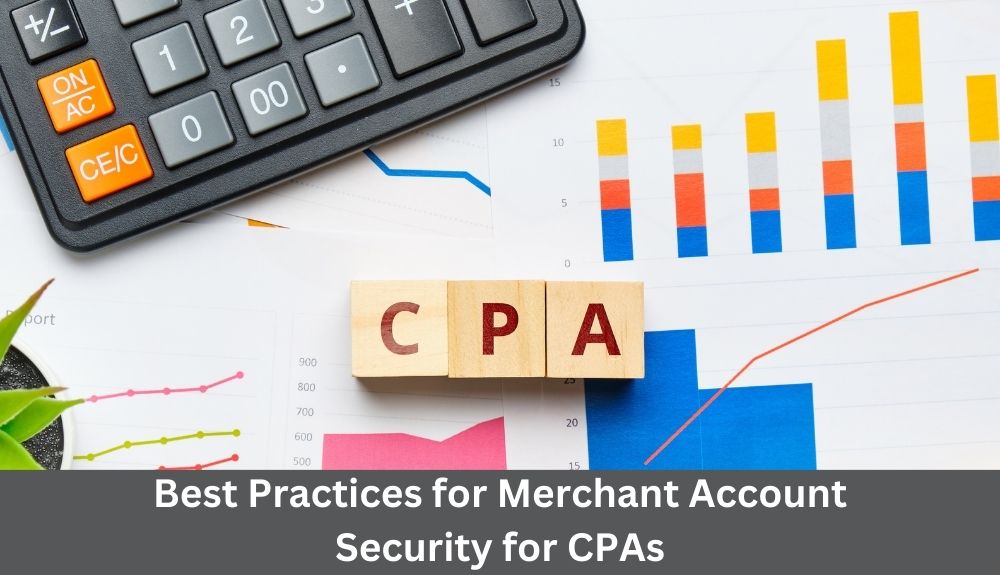The Future is Now: Explore the Best Merchant Accounts for CPAs

Best Options For Bad Credit Merchant Accounts 2023
December 27, 2023
Top Authorize.Net Merchant Account Providers in 2023
December 29, 2023Have you ever wondered how CPAs can stay ahead of the game in this fast-paced digital world? Managing finances and transactions for your clients is a crucial aspect of your profession, and having the right tools in place can make all the difference. That’s where merchant accounts come into play. In this blog, we will explore the best merchant accounts specifically tailored for CPAs, ensuring smooth payment processing, enhanced security, and improved client satisfaction.
Throughout this article, we will address the pain points that many CPAs face, such as complex payment processes, data breaches, and limited payment options. We will delve into the features and benefits of the top merchant accounts available, highlighting their ease of use, competitive rates, and robust fraud prevention measures.
1. The Importance of Merchant Accounts for CPAs
As a certified public accountant (CPA), it is crucial to have a merchant account for your business. A merchant account acts as an intermediary between your accounting firm and the payment processor, enabling you to accept various forms of payment from your clients. This section will explore why having a merchant account is essential for CPAs and highlight some of the best merchant account providers available for your accounting business.
1.1 Ensuring Smooth Credit Card Payments
In today’s digital age, the majority of businesses, including small businesses and online stores, rely on credit card payments to conduct transactions with their clients. As a CPA, being able to accept credit card payments is vital, whether you’re meeting clients in person or offering online invoicing services. Having a merchant account ensures that you can seamlessly process credit card payments, making it convenient for your clients and enhancing the overall customer experience.
1.2 Broadening Payment Options for Clients
By offering a variety of payment options, you cater to the preferences and convenience of your clients. With a merchant account, you can not only accept credit and debit cards but also explore other payment methods like mobile payment and contactless payment solutions. This versatility allows you to meet the needs of a wider range of clients, giving them the flexibility to choose their preferred payment method.
1.3 Streamlining Transaction Process
Efficiency is key when it comes to running an accounting firm. With a dedicated merchant account, you can streamline the transaction process by integrating a payment processor that manages the billing and invoicing procedures. This automated system ensures that you can easily track and reconcile all payments, minimizing human error and saving valuable time that can be better spent on providing accounting services to your clients.
1.4 Accessing Advanced Features and Tools
Merchant account providers often offer a range of advanced features and tools aimed at enhancing your business operations. These may include mobile apps for processing payments on-the-go, point-of-sale (POS) solutions for in-person transactions, and online reporting tools for monitoring your revenue and expenses.
2. Understanding Merchant Accounts
In the fast-paced world of online transactions and cashless payments, having a solid understanding of merchant accounts is essential for small business owners, including those in the CPA industry. A merchant account is essentially a type of bank account that enables businesses to accept credit and debit card payments from their customers. It serves as a crucial intermediary between the business, the customer, and the payment processor.
1. What is a Merchant Account?
A merchant account essentially functions as a holding account for the funds received from credit and debit card transactions. When a customer makes a purchase using their card, the funds from that transaction are first deposited into the merchant account. Later on, the funds are transferred to the business owner’s designated bank account.
2. How Do Merchant Accounts Work?
To understand how merchant accounts work, it’s important to grasp the overall payment process. When a customer makes a payment using a credit or debit card, the payment processor sends a request to the merchant account provider to verify and authorize the transaction. If the payment is approved, the funds are then transferred from the customer’s account to the merchant account. Subsequently, these funds are settled and transferred to the business owner’s bank account.
3. Types of Merchant Accounts
Merchant accounts come in different types to cater to businesses with various needs and requirements. Some common types include:
a. Traditional Merchant Accounts: These are typically suitable for businesses with physical storefronts or those focusing on in-person transactions. They require a point-of-sale (POS) system or a card reader to process payments.
b. Online Merchant Accounts: These are designed for businesses operating primarily through online platforms or e-commerce websites. They allow businesses to accept payments securely through their website or online store.
c. High-Risk Merchant Accounts: For businesses operating in industries deemed high-risk by payment processors, such as online gambling or adult entertainment, specialized high-risk merchant accounts may be necessary.
4. Key Considerations for Choosing a Merchant Account
When selecting a merchant account provider, it’s crucial to consider several factors to ensure it aligns with your business requirements. Some important considerations include:
a. Transaction Fees: Pay attention to the transaction fees charged by the provider. Compare rates and ensure they are competitive within the industry.
b. Monthly Fee: Some merchant account providers may charge a monthly fee for maintaining the account. Evaluate whether this fee is worth the services and benefits offered.
3. Benefits of Merchant Accounts for CPAs
Merchant accounts offer numerous advantages for Certified Public Accountants (CPAs) that can greatly improve their payment processing capabilities and overall business operations. Let’s explore some of the key benefits that merchant accounts bring to CPAs:
1. Streamlined Payment Processing:
With a merchant account, CPAs can accept credit card payments from their clients, making the payment process more convenient and efficient. This helps to eliminate the hassle of handling checks, cash, or waiting for bank transfers, allowing CPAs to receive payments faster and ensure a steady cash flow.
2. Increased Credibility and Professionalism:
Having a merchant account demonstrates professionalism and establishes credibility for CPAs. It indicates that they are equipped with the latest payment technologies and are committed to providing their clients with secure and convenient payment options. In a competitive industry like accounting, being able to offer clients multiple payment methods can give CPAs a competitive edge.
3. Enhanced Client Experience:
Merchant accounts enable CPAs to offer their clients various payment options, including credit cards, debit cards, and online payments. This level of flexibility gives clients the convenience of choosing their preferred payment method, making the overall experience more convenient and satisfying.
4. Improved Cash Flow Management:
With a merchant account, CPAs can automate their billing process and set up recurring payments for retainer clients. This helps to streamline cash flow management by ensuring timely, regular payments and reducing the administrative burden of manual invoicing.
5. Access to Advanced Features:
Merchant accounts provide CPAs with access to a range of advanced features that can optimize their payment processing. This includes features like mobile apps, POS solutions, online invoicing, and contactless payment options. These tools can improve efficiency, save time, and enhance the overall client experience.
6. Dedicated Customer Support:
Reputable merchant services providers offer dedicated customer support to assist CPAs with any payment-related issues or inquiries. Having reliable customer support ensures that any technical difficulties or questions can be addressed promptly, minimizing disruptions to the CPA’s business operations.
💡 key Takeaway: Merchant accounts offer CPAs streamlined payment processing, increased credibility, enhanced client experience, improved cash flow management, access to advanced features, and dedicated customer support, all of which contribute to the success and efficiency of their accounting business.
4. Key Features to Look for in Merchant Accounts for CPAs
When it comes to choosing the best merchant account for CPAs (Certified Public Accountants), there are several key features to consider. These features are crucial in ensuring that the merchant account meets the specific needs and requirements of a CPA business. By understanding and prioritizing these features, CPAs can streamline their payment processes, enhance their financial management, and provide a seamless payment experience for their clients.
1. Flexibility for Online and In-Person Payments:
A reliable merchant account for CPAs should support a wide range of payment options. This includes the ability to accept payments online through an e-commerce platform, as well as in-person payments through a point-of-sale (POS) system. This flexibility allows CPAs to cater to different client preferences and payment methods, whether it’s through card payments, contactless payments, or even online invoicing.
2. Secure and PCI Compliant:
Security is of utmost importance when handling financial transactions. CPAs deal with sensitive client information, which makes it vital to choose a merchant account that is Payment Card Industry Data Security Standard (PCI DSS) compliant. This ensures that all payment data is handled securely, reducing the risk of fraudulent activities or data breaches.
3. Competitive Pricing and Transparent Fee Structure:
CPA businesses thrive on efficiency and maximizing profitability. Therefore, it’s essential to select a merchant account with competitive pricing and a transparent fee structure. Look for accounts that offer competitive transaction fees, avoid hidden charges, and provide clear information about monthly fees and any additional costs. This allows CPAs to manage their expenses effectively and avoid any surprises in payment processing fees.
4. Robust Reporting and Analytics:
In order to track and manage financial transactions effectively, CPAs require access to advanced reporting and analytics tools. A merchant account that offers comprehensive reporting capabilities enables CPAs to monitor transaction trends, assess profitability, and gain valuable insights into their business. This empowers them to make informed financial decisions and optimize their overall performance.
5. Dedicated Customer Support:
Like any other service, having reliable customer support is vital when there are technical or payment-related issues. Look for a merchant account provider that offers prompt and responsive customer support. This ensures that any problems or concerns can be addressed quickly, minimizing disruptions to the business and providing peace of mind.
💡 key Takeaway: When selecting a merchant account for CPAs, it is crucial to prioritize features such as flexibility for online and in-person payments, security and PCI compliance, competitive pricing and a transparent fee structure, robust reporting and analytics.
5. Evaluating Merchant Account Fees and Pricing Structures

When choosing a merchant account for your CPA business, it’s crucial to understand the fees and pricing structures involved. Here, we will explore the key factors to consider while evaluating different merchant account options.
1. Transaction Fees:
Transaction fees are the costs associated with processing each payment made through your merchant account. It is important to compare the transaction fees offered by different providers. Some providers may charge a flat fee per transaction, while others may offer tiered or interchange-plus pricing models. Consider your business’s average transaction size and volume to determine which pricing structure aligns best with your needs.
2. Monthly Fees:
Many merchant account providers charge a monthly fee for access to their services. This fee may vary depending on the services and features included in the package. Evaluate the monthly fee in relation to the value provided by the provider, including factors such as customer support, payment gateway integration, reporting tools, and fraud prevention features.
3. Processing Volume and Discount Rates:
Discount rates are the percentage of each transaction that the provider charges as a fee. These rates can vary based on factors such as your processing volume, the type of card used (debit or credit), and the risk associated with your business. Evaluate discount rates offered by different providers and consider how they align with your business volume and projected sales. Negotiating lower rates based on your business performance is also possible with some merchant account providers.
4. Additional Fees:
In addition to transaction fees and monthly charges, be aware of any other fees associated with the merchant account. These may include chargeback fees, statement fees, batch fees, and cancellation fees. Carefully review the terms and conditions of each provider to understand the potential impact of these additional fees on your business’s financials.
5. Equipment and Integration Costs:
If you require hardware or software for in-person or online payments, consider the cost of purchasing or leasing equipment. Some providers may offer equipment at discounted rates or include it as part of their service package, while others may charge separately. Also, assess the ease of integration with your existing accounting software, online store, or POS system to ensure a seamless payment process.
6. Service and Support:
The level of customer support provided by the merchant account provider is essential for resolving any technical issues or addressing concerns promptly. Look for providers that offer reliable 24/7 customer support through various channels such as phone, email, or live chat. Read reviews and testimonials from existing customers to gauge the
6. How to Choose the Right Merchant Account for Your CPA Business
When it comes to running a CPA business, choosing the right merchant account is crucial for smooth financial transactions and client satisfaction. Here are some key factors to consider when selecting a merchant account for your accounting firm:
1. Identify Your Business Needs and Goals:
Assess your specific requirements, such as the volume of transactions, types of payments (credit cards, debit cards, online payments), and whether you need a virtual terminal or a physical card reader.
Consider your growth plans and scalability to ensure the merchant account can accommodate your future business needs.
2. Evaluate Transaction Fees and Pricing Structure:
Compare transaction fees and processing rates among different merchant services providers.
Look for transparent pricing structures that align with your transaction volume and ensure there are no hidden charges or surprise fees.
3. Determine the Level of Customer Support:
Consider the level of customer support provided by the merchant account provider.
Look for options like 24/7 customer service availability and dedicated account managers who can assist with technical issues or payment disputes.
4. Examine Security and Fraud Protection:
Prioritize a merchant account provider that offers robust security measures to protect sensitive financial information.
Look for features such as tokenization, encryption, and fraud detection systems to ensure secure payment processing.
5. Research Integration Options:
If your CPA business utilizes specific accounting software or an online store platform, make sure the merchant account integrates seamlessly with these systems.
This integration will streamline your financial processes and ensure accurate record-keeping.
6. Consider Mobile and Contactless Payment Solutions:
With the growing popularity of mobile payment methods and contactless transactions, ensure that the merchant account provider offers options such as mobile apps and contactless payment terminals.
This will allow you to provide convenient payment options for your clients and adapt to evolving customer preferences.
7. Evaluate Additional Features and Services:
Look for value-added services like online invoicing, advanced reporting capabilities, and POS solutions tailored to the needs of your CPA business.
Assess whether the merchant account provider offers personalized dashboards and analytics to help you gain insights into your financial transactions.
8. Read Reviews and Seek Recommendations:
Research customer reviews and testimonials to gather insights into the experiences of other CPA businesses with different merchant account providers.
Seek recommendations from colleagues or industry associations to get first-hand feedback before making a decision.
7. Steps to Set Up a Merchant Account for CPAs
Setting up a merchant account for CPAs is a crucial step for any accounting firm looking to streamline their payment process and provide convenient payment options to their clients. Follow these steps to get your merchant account up and running smoothly:
1. Research Different Merchant Services Providers (MSPs)
Look for reputable and reliable merchant services providers that specialize in catering to CPAs and accounting firms.
Consider the specific needs of your CPA business, such as the types of payment options you want to offer, the level of customer support required, and any advanced features you may need for your accounting processes.
2. Compare Fees and Rates
As you evaluate different MSPs, pay attention to the fees and rates associated with their services.
Consider factors such as monthly fees, transaction fees, credit card processing fees, and any additional charges that may apply.
Keep in mind that while competitive pricing is essential, it’s also crucial to prioritize the quality of service and reliability of the MSP.
3. Assess Security and Compliance Measures
Given the sensitive financial information involved in CPA transactions, data security and compliance should be a top priority.
Ensure that the MSP you choose has robust security measures in place, including encryption technologies and PCI-DSS compliance.
Consider any additional security features offered by the MSP, such as fraud detection tools and chargeback protection.
4. Determine Your Payment Options
Consider the types of payment options you want to offer your clients, such as credit card payments, debit card payments, and contactless payments.
Assess whether you need in-person payment solutions like mobile card readers or POS systems, or if online invoicing and payment processing will suffice.
5. Gather the Necessary Documentation
To set up a merchant account, you’ll typically need to provide certain documents to the MSP.
This may include your business’s legal identification, bank account details, and possibly some financial records.
6. Fill Out the Application
Once you’ve selected an MSP and gathered the required documentation, proceed to fill out the merchant account application.
Follow the instructions carefully, providing accurate and up-to-date information to expedite the process.
8. Tips for Successfully Managing a Merchant Account as a CPA
Managing a merchant account as a Certified Public Accountant (CPA) requires careful consideration and attention to detail. To ensure success, here are some valuable tips to keep in mind:
1. Choose the Right Merchant Services Provider (MSP)
Research and compare various MSPs to find the one that best suits your specific needs as a CPA.
Look for providers that offer competitive rates, transparent fee structures, and exceptional customer support.
Consider the needs of your clients as well, such as whether they require online invoicing or mobile payment options.
2. Understand the Fee Structure
Familiarize yourself with the different types of fees associated with your merchant account.
Be aware of transaction fees, monthly fees, statement fees, and any other charges that may apply.
Ensure that you have a clear understanding of how these fees will impact your overall profitability as an accounting firm.
3. Prioritize Data Security
Protecting your clients’ financial information is of utmost importance.
Opt for a merchant services provider that offers robust security measures such as data encryption and fraud prevention tools.
Regularly update your systems and software to stay ahead of potential cyber threats.
4. Leverage Advanced Features
Explore the advanced features offered by your chosen merchant services provider.
Look for features like contactless payments, mobile apps, or POS solutions that can enhance the payment experience for your clients.
These features can help streamline transactions and improve overall efficiency for your CPA business.
5. Customize Billing Processes
Tailor your billing processes to meet the specific requirements of your clients and your accounting firm.
Set clear payment terms and conditions, and ensure that you provide accurate and detailed invoices.
Consider automating the billing process with your merchant account to minimize errors and save time.
6. Monitor Cash Flow Regularly
Stay on top of your cash flow by regularly monitoring your merchant account transactions.
Use reporting tools provided by your MSP to track payments, refunds, chargebacks, and other financial activities.
This will help you maintain a healthy financial status and quickly resolve any discrepancies.
7. Stay Updated with Industry Regulations
Keep yourself informed about the latest regulations and compliance requirements related to merchant accounts.
This includes understanding PCI-DSS (Payment Card Industry Data Security Standard) and any other relevant industry standards.
9. Integrating Merchant Accounts with Accounting Software
In today’s digital age, businesses are striving to streamline their operations and provide seamless payment experiences to their customers. For accounting firms, the integration of merchant accounts with accounting software has become increasingly important. This section delves into the significance of this integration and the benefits it offers to CPA businesses.
1. Simplified Financial Tracking:
By integrating merchant accounts with accounting software, CPA firms can automate the transaction recording process. All payment data, including credit card and debit card transactions, can be automatically synced with the accounting software. This eliminates the need for manual data entry, reducing the chances of errors and saving valuable time for the accounting team.
2. Easy Reconciliation:
Reconciling transactions can be a daunting task for accounting firms, especially when dealing with multiple payment methods. However, with integrated merchant accounts, the process becomes much simpler. The software can match the payments received from customers with the corresponding invoices, making reconciliation a breeze.
3. Efficient Invoicing:
Integrated merchant accounts enable seamless integration with invoicing features within accounting software. This allows CPAs to generate professional invoices that can be directly sent to clients. The software can automatically update the payment status of each invoice, providing real-time visibility into outstanding payments and helping to improve cash flow management.
4. Comprehensive Reporting:
Accurate and comprehensive reporting is vital for any CPA firm. With merchant account integration, accounting software can generate detailed reports on revenue, sales trends, and payment processing fees. These insights help CPA businesses make informed financial decisions and identify areas for improvement.
5. Enhanced Security:
Security is a crucial aspect of any payment transaction. Integrating merchant accounts with accounting software ensures that all financial data is securely stored and protected. This eliminates the need for manual handling of sensitive information, reducing the risk of data breaches and fraud.
6. Seamless Customer Experience:
By integrating merchant accounts, CPAs can offer their clients a seamless and convenient payment experience. Whether it’s accepting payments online, in-person, or through mobile devices, the integration ensures smooth and efficient payment processing. This enhances customer satisfaction and builds trust with clients.
💡 key Takeaway: Integrating merchant accounts with accounting software offers numerous benefits for CPA businesses, including simplified financial tracking, easy reconciliation, efficient invoicing, comprehensive reporting, enhanced security, and a seamless customer experience.
10. Best Practices for Merchant Account Security for CPAs

As a Certified Public Accountant (CPA), ensuring the security of your merchant account is of utmost importance. With the rising trend of online transactions and the need for streamlined payment processing in today’s digital landscape, it is crucial to implement best practices to protect your clients’ sensitive financial information. Here are some key measures you can take to enhance the security of your merchant account:
1. Stay Up-to-Date with PCI Compliance:
Regularly review and comply with the Payment Card Industry Data Security Standard (PCI DSS) guidelines.
Keep track of any updates or changes in the requirements to ensure ongoing compliance.
Employ secure payment gateways and processors that adhere to PCI DSS.
2. Implement Strong Password Policies:
Utilize complex and unique passwords for your merchant account.
Regularly update passwords and avoid using easily guessable information.
Enable multi-factor authentication for an added layer of protection.
3. Secure Network Infrastructure:
Utilize firewalls, intrusion detection systems, and malware protection to safeguard your network.
Regularly update and patch your system software to fix any vulnerabilities.
Limit access to your merchant account to authorized individuals and regularly audit user privileges.
4. Encrypt Customer Data:
Ensure that all customer data, particularly payment card information, is encrypted during transmission and storage.
Use SSL/TLS protocols to establish secure connections for online transactions.
Regularly audit your encryption protocols to ensure they meet industry standards.
5. Monitor and Detect Suspicious Activities:
Utilize fraud detection tools and monitoring systems to identify any unusual or potentially fraudulent activities.
Implement real-time alerts to notify you of any suspicious transactions.
Regularly review transaction logs and account activity to identify any unauthorized access attempts.
6. Train Staff on Security Protocols:
Educate your employees on best practices for handling sensitive customer information.
Conduct regular training sessions to keep them updated on the latest security threats and preventive measures.
Implement strict policies regarding the handling of customer data and ensure adherence to them.
💡 key Takeaway: Implementing robust security measures for your merchant account is vital to safeguarding your clients’ financial information. Stay compliant with PCI DSS guidelines, utilize strong passwords, secure your network infrastructure, encrypt customer data, monitor for suspicious activities, and provide ongoing training to your staff.
11. Industry Trends and Future of Merchant Accounts for CPAs
In the fast-paced world of finance and accounting, it is essential for Certified Public Accountants (CPAs) to stay ahead of the curve. One area that is constantly evolving is the realm of merchant accounts. As digital transactions become the norm, CPAs need to be aware of the industry trends and the future of merchant accounts to ensure they are equipped with the best payment processing options for their clients.
1. Rise of Mobile Payments:
With the increasing popularity of smartphones and mobile devices, mobile payments have become a significant trend in the industry. CPAs should consider offering their clients the ability to accept mobile payments through their merchant accounts. By providing a seamless mobile payment experience, CPAs can cater to the needs of their tech-savvy clients and stay competitive in the market.
2. Contactless Payments:
Contactless payments, such as Apple Pay and Google Pay, have gained immense popularity in recent years. These payment methods offer convenience and speed, making them a preferred choice for many customers. CPAs should explore merchant accounts that support contactless payments to offer their clients a wide range of payment options.
3. Enhanced Security Measures:
As digital transactions increase, so does the concern for security. Consumers and businesses alike are more conscious about protecting their financial information. CPAs should prioritize merchant accounts that offer advanced security features, such as encryption and tokenization, to ensure the safety of their clients’ payment data.
4. Integration with Accounting Software:
Efficiency and accuracy are paramount for CPAs in managing their clients’ finances. Therefore, merchant accounts that seamlessly integrate with accounting software can streamline the billing process and save valuable time. Look for merchant account providers that offer integrations with popular accounting platforms like QuickBooks or Xero.
5. Customized Reporting and Analytics:
To gain valuable insights into their clients’ payment activities, CPAs should seek merchant accounts that provide comprehensive reporting and analytics tools. These features allow CPAs to analyze transaction data, monitor cash flow, and identify trends that can inform financial decision-making.
6. Continued Growth of E-commerce:
As more businesses establish an online presence, CPAs must adapt to the growing e-commerce landscape. Merchant accounts that offer robust online payment solutions, including secure payment gateways and shopping cart integrations, empower CPAs to support their clients’ online stores effectively.
Conclusion
In conclusion, as a CPA, securing the right merchant account is crucial for your business’s success in the digital age. With options like Stripe, PayPal, and Square, you can streamline your payment processing, enhance your credibility, and optimize your financial management. In this blog, we have explored the key features, benefits, and considerations of these top merchant account providers. Stripe stands out for its customizable payment solutions, robust security features, and seamless integration with accounting software. PayPal offers global reach, strong buyer protection, and a user-friendly interface. Square provides all-in-one convenience, extensive reporting capabilities, and a range of hardware options.




